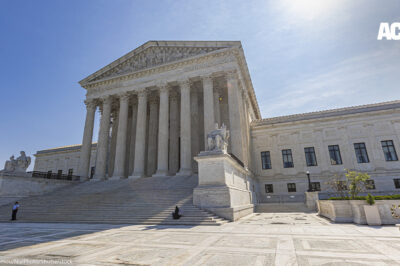June 25 marked the 70th anniversary of President Franklin Roosevelt's, Executive Order 8802, which prohibits discrimination on the basis of race, color, religion and national origin in federal defense contracts. It is important to understand both the historical implications of this executive order and how it was reversed by President George W. Bush's "Faith-Based" executive order more than 60 years later.
At the time Executive Order 8802 was issued, civil rights leader A. Philip Randolph believed that the African-American could never achieve true political freedom until he was economically secure. He organized the Brotherhood of Black Sleeping Car Porters to fight unfair employment practices among black railroad workers. He called on African-Americans to join the first March on Washington to protest employment discrimination. President Roosevelt, feeling pressured by the impending march, signed Executive Order 8802 to prohibit discrimination against workers in defense industries; a sign of progress for all citizens.
Unfortunately, justice in the law does not always lead to justice in practice. The Jim Crow era and ongoing racial segregation and inequality compounded hardships for many African-Americans so that they could never be truly free in the way Randolph envisioned. President John F. Kennedy issued Executive Order 10925 in 1961 to reaffirm and extend the federal government's anti-discrimination policy by prohibiting federal government contractors from discriminating on account of race, religion and national origin. And some Jim Crow laws were ultimately dismantled by the Civil Rights Act of 1964.
Though America showed signs of progress, de facto segregation and inequality continued and persists today. The standards for race, religion and national origin are subject to strict scrutiny under the law, the highest level of review the courts use to weigh constitutional rights and interests. Difficulty in proving discrimination, however, means the ideals of the law must often yield to less strict application in practice. For example, persistent inequality in employment is felt especially by African-Americans, as evidenced by the fact that they are currently unemployed at a rate of — 16.2 percent, well above the overall national rate of less than ten percent.
While government had generally been the leader in helping to advance the cause of equality in employment, President Bush tipped Lady Justice's scales back toward injustice and legalized discrimination. He signed Executive Order 13279, which created an exemption to the nondiscrimination provisions established previously, permitting any government contractor that is a "religious corporation, association, educational institution, or society" to engage in religious hiring discrimination. We have, indeed, moved into the 21st Century, but continue to fight the battles of the 20th.
As a result of President Bush's executive order, religious organizations that contract with the government can, when hiring for government-funded jobs, ask what your specific religious beliefs are. Such discrimination was illustrated on the state level in the case of Bellmore v. United Methodist Children's Home, which denied a Jewish applicant, Alan Yorker, employment at a Georgia children's home on account of his faith. The case settled and religious organizations that received state funding could no longer discriminate. The same rules should apply to the federal government.
The Bellmorecase highlights the poignant connection between the struggles of past and present. Mr. Yorker's grandfather, Harry Monjesky, worked for many years as a conductor on the New York Central Railroad. Then, during a recession, the railroad laid off the Jewish and African-American workers first, regardless of their seniority — including Yorker's grandfather. To ensure that his family would, in the future, be judged on merit and not by name, his father changed their family name to Yorker. But in the end, Alan Yorker was still a victim of religious discrimination years later.
President Obama can reverse the backward course of some civil rights protections by using the milestone 70th anniversary of Roosevelt's Executive Order to restore the protections that President Bush altered. Please take action in asking President Obama for his support.
Many presidents will continue to try to revise history in practice or by order. But time waits on no man; we shall march forward toward political freedom regardless — and continue to struggle against the reversals until true and lasting equality is achieved.
Learn more about government-funded religion: Sign up for breaking news alerts, follow us on Twitter, and like us on Facebook.



